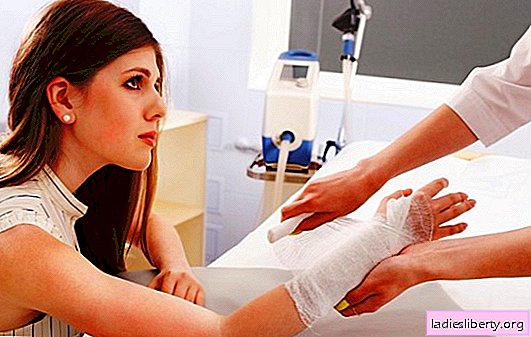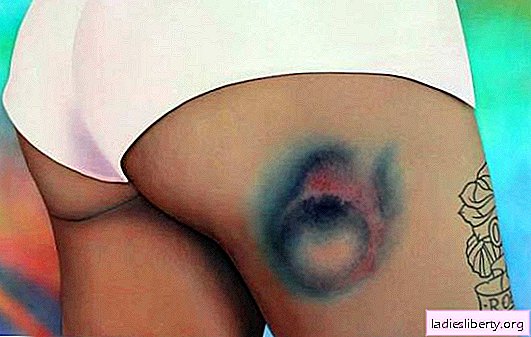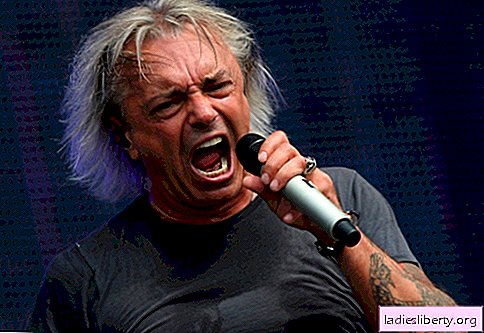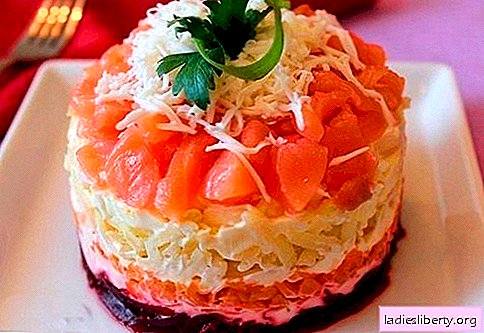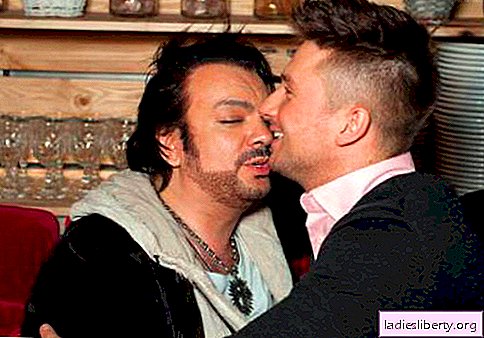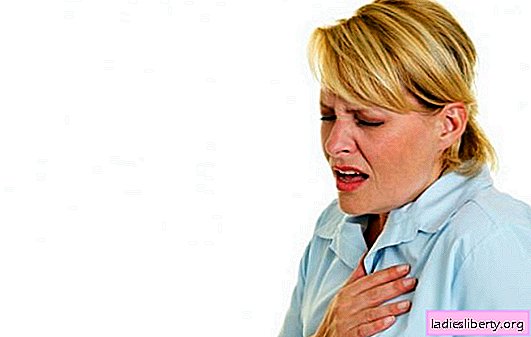
Many people know firsthand what chest pains are.
However, not everyone is paying attention to them, believing that this is a trifle, which itself will pass.
But such a symptom may indicate the presence in the body of a variety of disorders.
Chest in the middle hurts: causes
The appearance of pain in the chest in the middle can be associated with pathology of the heart or blood vessels, diseases of the spine, especially its thoracic region, problems in the lungs or bronchi, upset gastrointestinal tract, intercostal neuralgia, thyroid disease, or even somatic dysfunction of the nervous system.
Consider these diseases in more detail.
The causes of chest pain can be:
• coronary heart disease, angina pectoris, myocardial infarction are characterized by pressing pains that occur mainly on the left, but can also be felt in the middle.
• thoracic osteochondrosis is a disease of the intervertebral disc. They become thinner, their shock-absorbing function worsens, as a result of which the gaps between the vertebrae increase, they come closer and nerves get pinched. At the same time, a person has point pains in the chest, as an intercostal neuralgia. If left untreated, the disease progresses further. As the height of the discs decreases, they will bulge more and more and eventually fall out of the spine, forming a hernia, which compresses the nerve roots and causes pain in the chest in the middle or in the heart.
• diseases of the lower respiratory system, such as bronchitis, pneumonia, pleurisy, tuberculosis, a tumor. The pain occurs during a coughing fit and intensifies with a deep breath. In this case, there is an increase in temperature, headaches, body aches, shortness of breath.
• with pleurisy, a lot of fluid accumulates in the pleural cavity, which presses on the intercostal muscles and diaphragm, causing pain.
• with tuberculosis and tumors, in addition to pain in the chest cavity, there is the appearance of streaks of blood in a cleared sputum, general weakness and a slight increase in body temperature (up to 37.5 degrees).
• with heart neurosis, the chest in the middle often hurts. This is a functional disorder of the nervous system resulting from its overstrain. With cardiac neurosis, pain is often paroxysmal, less often they become permanent. The attack begins with a feeling of lack of air and tingling in the chest. Then the pulse accelerates. It seems to a man that he will suffocate now. Most often, an attack provokes emotional stress.
• intercostal neuralgia is characterized by pain in the location of the intercostal nerves. It intensifies during inspiration and during movement, subjectively perceived by a person as pain inside the chest.
• with an ulcer of the stomach or duodenum, the chest in the middle often hurts. Such pains are often accepted by a person, like heart pain. But there is one difference. The appearance of pain in gastric diseases depends on food intake. Ulcers are characterized by so-called "hungry" pains that occur 1-2 hours after eating. It is enough to eat at least a piece of bread, and they almost disappear.
• biliary dyskinesia. Cramping occurs in the gallbladder, resulting in chest pain. Since the pain is very similar to an angina attack, an additional examination is necessary to make a diagnosis.
• Thyroid pathology can cause middle chest pain. At the same time, a tumor in the cervical region or chest, general weakness, changes in the patient's weight, pressure surges, and an increase in body temperature can also be observed.
• vegetative-vascular dystonia causes malfunctions in the autonomic nervous system. It is manifested by painful sensations in the head, stomach, heart, panic attacks. In this case, the chest in the middle can hurt.
Chest in the middle hurts: first aid for injury
The chest can be sick not only with various diseases, but also after an injury, in which rib fractures or damage to vital organs often occur.
Relief of breathing after injury:
• give the patient a sitting or semi-sitting position;
• if tight outerwear is present, unfasten it;
• allow the victim to smell ammonia or wipe his skin in the temple area;
• provide the patient with maximum peace;
To improve heart function:
• give the patient to drink 15-20 drops of corvalol or another vasodilator;
To avoid shock:
• give the victim 2 tablets of an anesthetic drug (ketans, analgin);
• put something cold on the chest;
• if there are visible fractures of the ribs, immobilize them;
• warm the patient;
• monitor the condition before the arrival of the ambulance crew.
In case of injury, in addition to the above measures, it is necessary to treat the skin around the wound with an antiseptic solution (hydrogen peroxide, iodine, zelenka), apply a sterile dressing to the wound and apply cold.
Chest in the middle hurts: treatment if there was no injury
The treatment for chest pain depends on the disease that caused them.
With angina pectoris just put 1-2 tablets of nitroglycerin under the tongue. If the pain persists after 4-5 minutes, you need to call an ambulance, as this may indicate a more serious pathology, such as myocardial infarction.
With breast osteochondrosis it is necessary to restore the correct mobility of the intervertebral discs. For this, a set of exercises is selected, and general strengthening drugs are prescribed.
In case of detection inflammatory diseases of the respiratory system it is necessary to take anti-inflammatory drugs and substances that improve coughing up sputum.
Treatment intercostal neuralgia consists in intramuscular administration of painkillers and B vitamins.
To cure cardioneurosis you need to eliminate the cause of the disease and strengthen the body. It is recommended to avoid stressful situations, observe the daily regimen and consume the maximum amount of fresh fruits, which contain vitamins and minerals that contribute to the restoration of the nervous system.
For increase stress tolerance You can take a relaxing massage course. Acupuncture and vacuum therapy also have a beneficial effect on the nervous system, relieving excess tension. Doctors practice the use of herbal remedies that help get rid of excessive emotionality, as a result of which the pain in the chest cavity and other symptoms of heart neurosis disappear.
Treatment gastric and duodenal ulcers It is aimed at eliminating the causes of its occurrence and healing of the formed defect. Here you can not do without a diet. For the treatment period, it is necessary to exclude from the diet fried and spicy dishes, freshly squeezed juices, sweets.
If the cause of the disease is bacterium Helicobacter pylori, you need to take a specific complex of antibiotics. Used drugs that reduce the acidity of gastric juice and restore the integrity of the mucous membrane of the stomach or duodenum. Severe pain will relieve antacids.
For getting rid of the IRR use psychotropic drugs, substances that improve cerebral circulation and vitamin complexes. Also, physiotherapy gives a good effect.
Chest in the middle hurts: when to see a doctor
As you can see from the above, chest pain in the middle is a rather unpleasant phenomenon that can indicate a serious illness.
Emergency medical help is needed:
- with severe pain in the chest, accompanied by fainting or a coughing fit after exercise;
- with burning pain or a feeling of intense fullness in the chest cavity, which gives to the left shoulder, neck or lower jaw;
- with severe pain that does not pass within 15 minutes and is not relieved after rest;
- when there is a feeling of compression inside the chest cavity, combined with an acceleration of the pulse, heavy breathing, sweating, dizziness, a sense of anxiety;
- high-intensity pain with shortness of breath and the appearance of blood when coughing.
- It is necessary to visit a doctor:
- for pains similar to heartburn that do not go away after taking medications for heartburn;
with repeated pain after eating that relieves antacids.

